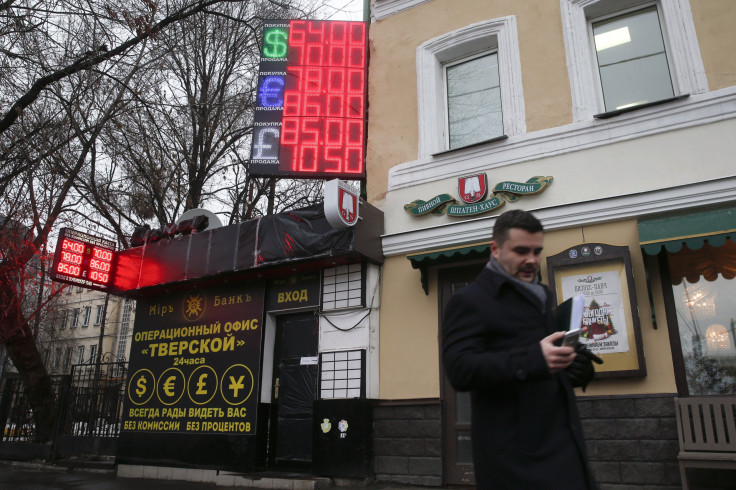Russians Both Shrug and Worry As Ruble Nosedives

MOSCOW -- To people outside Russia, it might be ironic that President Vladimir Putin landed the title "Political Person of the Year" in a poll released on Tuesday -- the same day the ruble tanked to a record low.
But for Russians, Putin, who has dominated the political landscape for 15 years now, is the backdrop to all the news. What's more, for most Russians, life goes on as usual no matter what the news is.
Even amid global headlines about the ruble's collapse, Muscovites made their typical trips to the food stores without panic. Some people made last-minute attempts to convert their rubles into dollars and euros. Though a Russian news website said banks were suspending foreign currency services on a large scale, no specific banks have done so just yet. A drop in oil prices is also hurting Russian exports and the government’s budget, and the ruble disaster is the latest in a string of woes to hit the shrinking Russian economy -- but people in Moscow aren’t going back to the times of Soviet penury.
"It's no big deal, because I've been expecting this" for about a year, said Maxim Rogozin, a 40-year-old sales manager, while shopping in the liquor aisle at a supermarket in a residential Moscow neighborhood.
But the news is undoubtedly harsh. In Tuesday trading, the ruble hit its lowest point against the U.S. dollar since Russia's 1998 default, at one point falling 19 percent. It fell to 78.4 rubles to the dollar at 11 a.m. Moscow time before recovering a little in the afternoon and reaching 67.5 rubles just before 8 p.m. local time, according to Bloomberg data.
While Tuesday's dive is the steepest one-day drop in recent memory, the ruble has been falling sharply this month and especially the past week. Just last Tuesday, it was trading at 54.2 to the dollar.
The ruble's woes have been snowballing this year, as the currency has lost more and more value during the conflict in eastern Ukraine between Russian-backed rebels and Ukrainian fighters, and the subsequent sanctions imposed on Russia by the U.S. and European Union. On Jan. 1 the ruble traded at 32.9 to the dollar; by Oct. 31 it was at 43.
Though most Russians buy domestically produced food and live in a ruble-denominated world -- it is illegal to sell goods in any other currency -- the sudden drop "has an indirect effect" on the typical Russian, said Vladimir Tikhomirov, chief economist at BCS Financial Group in Moscow. Roughly 10 percent to 20 percent of all goods consumed by Russians actually have direct exposure to imports and, as a result, to the ruble-dollar exchange rate, he said.
Tikhomirov predicted that companies and stores will replace some goods with cheaper domestic ones, but that approach will only go so far because Russia can't rapidly expand manufacturing.
"It would be very hard for local producers to increase production," he said, because Russia's central bank just raised a key interest rate 6.5 percentage points at a meeting Tuesday morning, making borrowing far costlier.
One segment hard-hit by the ruble's depreciation, however, is the sliver of Russians who travel abroad for vacations, as it cuts into their buying power for hotel rooms and meals. Tatyana Filyakova, 33, said she, her husband and their two young children would spend this year's winter vacation in the ancient city-museums around Moscow instead of abroad. A wristwatch saleswoman for a Japanese brand, Filyakova was sporting a short fur jacket as she picked out coffee in the supermarket.
"Going off someplace is awful" because of the ruble's drop, she said, adding her friends also were starting to drop trips overseas.
Galina Turishcheva had a rude surprise Tuesday while picking up her passport for her annual trip to Spain. A language instructor at Moscow State University and an amateur flamenco singer, she has spent the past four winters in Seville. Before stopping in a Moscow office for her passport, a neon exchange sign was showing a dollar rate of 63.99 and euro rate of 81.89. When she emerged 15 minutes later, those numbers had shot up to 67.50 and 84.60.
"This January I was going to travel there again to study, but with this catastrophic euro rate, the plans I had been dreaming about aren't destined to turn out," Turishcheva said.
For some Russians, the currency crisis has very real consequences. One of them is Valeria, a photographer and editor in Moscow just finishing a long maternity leave, who has has been spending two or three months at a stretch in milder climates because her son, 3, has digestive and orthopedic problems. Now, she may not be able to do that anymore.
Valeria, who asked that her last name not be used, has been in Turkey with her son since October while her husband earns money in Moscow. "We have been paying for our stay each week, and each week there has been a new amount" to fork over at their economy hotel because of the weakening ruble, she emailed from Turkey. "We don't want to think about how many Turkish lira we'll buy with our money," she added.
Valeria and her spouse "are worried by the drop in the ruble," especially since they have a lot of debt from their son's medical care. As for her husband, a staff photographer at a news organization, he spent Tuesday running around the Russian capital, snapping photos. He was photographing Muscovites converting their rubles.
© Copyright IBTimes 2024. All rights reserved.











